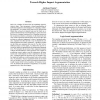Free Online Productivity Tools
i2Speak
i2Symbol
i2OCR
iTex2Img
iWeb2Print
iWeb2Shot
i2Type
iPdf2Split
iPdf2Merge
i2Bopomofo
i2Arabic
i2Style
i2Image
i2PDF
iLatex2Rtf
Sci2ools
122
click to vote
NMR
2004
Springer
2004
Springer
Towards higher impact argumentation
There are a number of frameworks for modelling argumentation in logic. They incorporate a formal representation of individual arguments and techniques for comparing conflicting arguments. An example is the framework by Besnard and Hunter that is based on classical logic and in which an argument (obtained from a knowledgebase) is a pair where the first item is a minimal consistent set of formulae that proves the second item (which is a formula). In the framework, the only counter-arguments (defeaters) that need to be taken into account are canonical arguments (a form of minimal undercut). Argument trees then provide a way of exhaustively collating arguments and counter-arguments. A problem with this set up is that some argument trees may be “too big” to have sufficient impact. In this paper, we address the need to increase the impact of argumentation by using pruned argument trees. We formalize this in terms of how arguments resonate with the intended audience of the arguments. ...
Related Content
| Added | 02 Jul 2010 |
| Updated | 02 Jul 2010 |
| Type | Conference |
| Year | 2004 |
| Where | NMR |
| Authors | Anthony Hunter |
Comments (0)

